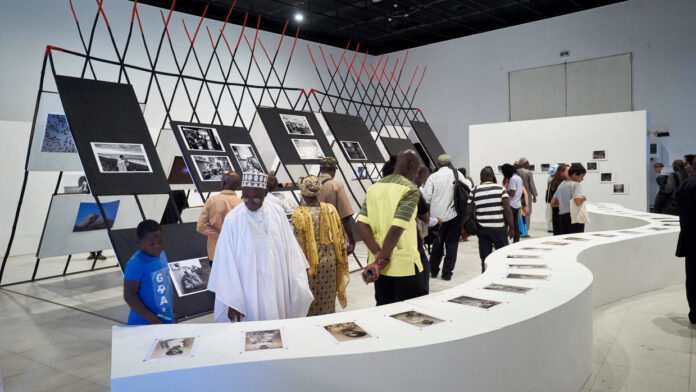The Biennale of African Photography is a major international exhibition of contemporary photography held every two years since 1994 in Bamako, Mali, with regular seminars and film screenings; it is jointly managed by the Malian government and the Institut Français. The main venues are the National Museum of Mali, the District Museum, and the National Library.
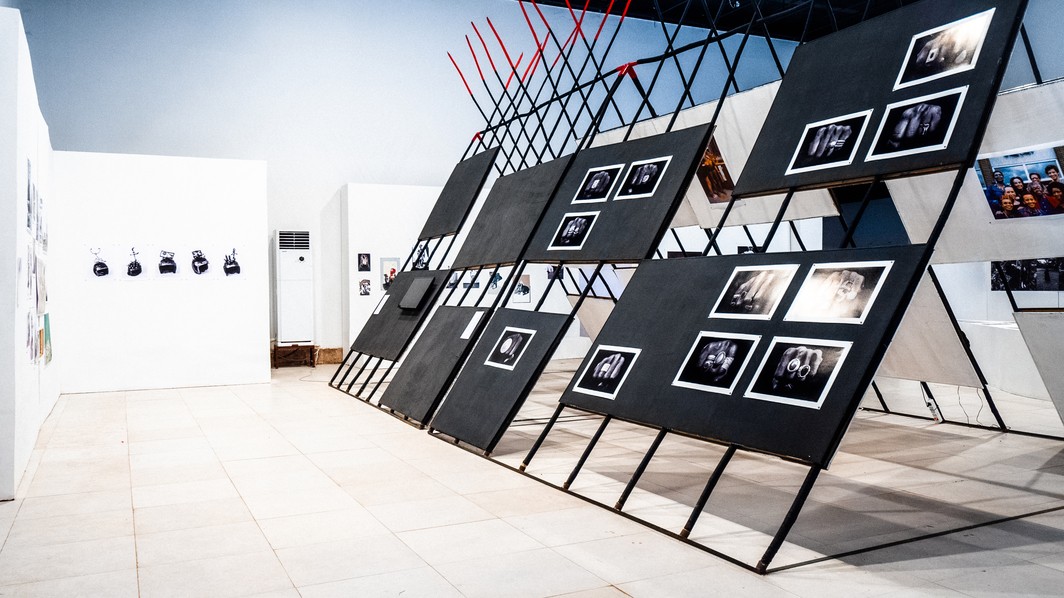
Inspired by both Mali’s rich cultural traditions of storytelling and the nation’s recent political upheavals, the forthcoming edition questions the methods by which artists narrate real and imagined experiences through different economies of time. In chronicling how artists address the unpredictable relationship between political action, social realities, and aesthetic experience, Telling Time offers a multiplicity of perspectives from which to assess the biennale’s enduring role as an international convener of lens-based practices in Africa.
Historically, photographic images have been routinely interpreted as refractions of time and space relations, serving to advance visual arguments about the particularities of a given reality. Within this context Telling Time presents a nuanced array of lens-based projects that differently upend and reframe conventional interpretations of time through discrete structures of past, present, and future. The artists assembled use photography, film, video and animation to construct perspectives on time that are fragmented, disjunctive, or recursive in nature, offering alternative methods of engaging histories, experiences, and desires.
The biennial event is organized by the government of Mali and the Institut Français. The eleven events held for 2019 showcased the work of a number of renowned photographers, including the works of William Kentridge, Samuel Fosso, documentary filmmaker Peter Hugo and Zanele Mohali.
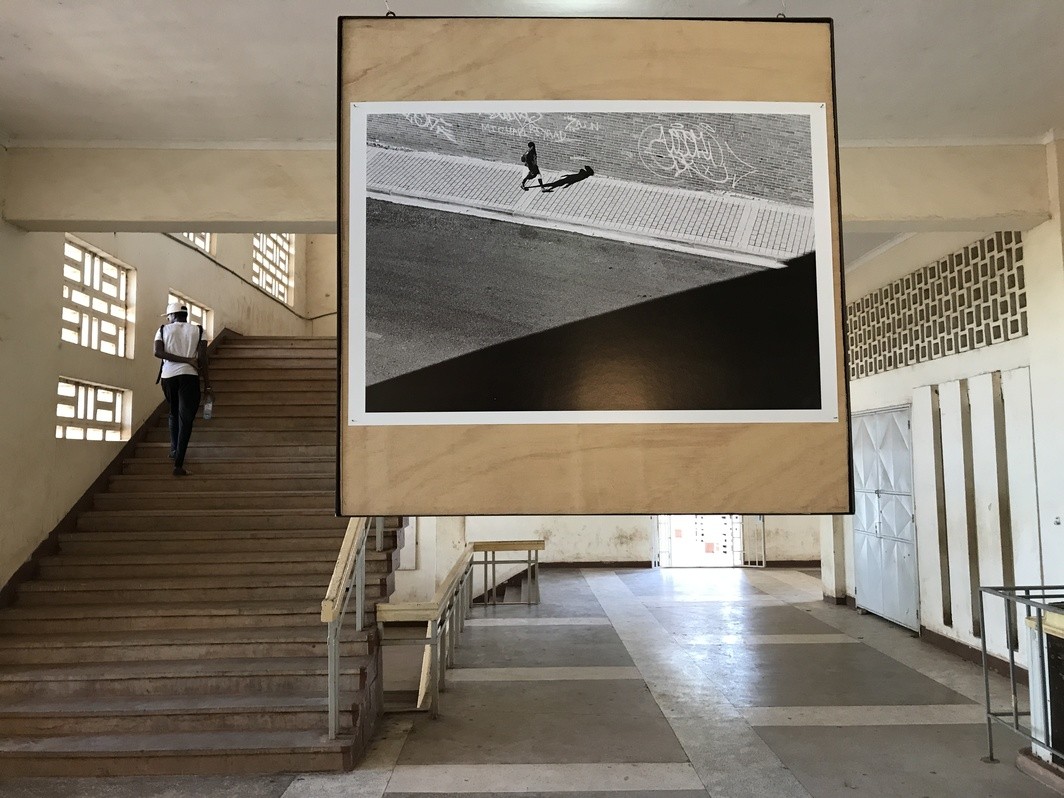
The Biennale also offers several prizes and awards in addition to a special jury prize, including the Coup de coeur Accor, the AFAA-Afrique en Creation, a separate award for photojournalism and the Elan de l’Agence Française de Developpement.
The 2013 Biennale was canceled due to security concerns, see “The Toureg Rebellion. Tuareg Uprising 2012 – 2013. From October 31 to December 31, 2015, the tenth, anniversary event was held – it was directed by curator Bisi Silva. The organizers of the 2017 exhibition believed that “Africa benefits from a Western enthusiasm that cannot be shaken by terrorism or social, political or military conflicts. At the same time, on the African continent, a new generation of thinkers and cultural figures is renewing interpretive frameworks and holding out hope that Africa will find solutions to its problems as long as the continent’s inhabitants are armed with the right conceptual tools.” The 2019 event is self-titled “Streams of Consciousness” lit. streams of consciousness; it took place from November 30, 2019, to January 31, 2020, under the artistic direction of Bonaventure Soh Bejeng Ndikung, b. 1977.
That’s an impressive run, not least because Mali has been in the grip of a complicated armed conflict since 2012, which has put much of the country’s north out of government control and in the hands of various factions. Bamako is away from the war zone but has faced terrorist attacks, and the government relies on a buffer of French and United Nations forces to maintain stability. Once a beloved destination for culture and adventure travelers, Mali now mostly hosts military and aid workers. But life goes on: In the capital’s low-rise sprawl, the more immediate obstacles are the omnipresent dust, diesel fumes, and sluggish traffic that bottlenecks at the three bridges across the Niger River.
13th edition of “Bamako Encounters – African Biennale of Photography” 2021
The organizers of Bamako Encounters – African Biennale of Photography are calling for African artists working on and off the continent, to participate in the 13th edition. Titled “Maa ka Maaya ka ca a yere kono”, artists are invited to reflect on ‘multiplicity, difference, becoming and heritage’.
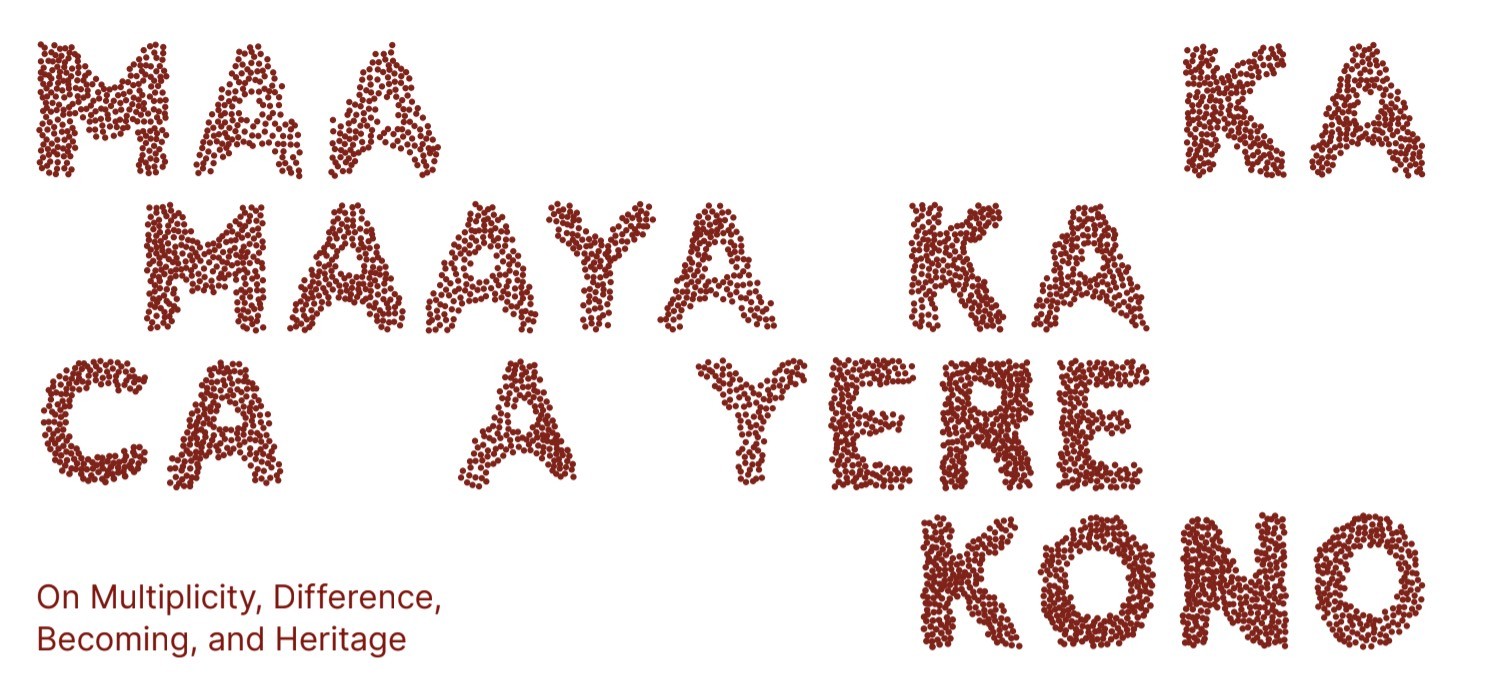
Focusing on Multiplicity, Difference, Becoming, and Heritage, the biennale takes on the dominant narrative of the ‘globalized world’: that of singularity – universalism, single identities, singular cultures, insular political systems. With this narrative, however, comes an illusory sense of stability and stasis; identities seem inalterable, cultures are immutable, political systems prove uneasy in the face of change. Thus, in sustaining this pervasive discourse, there has been a great loss of multiplicity, fragmentation, process and change, and not least, of complex notions of humanity and equally complex narratives.
The Bamako Encounters will pay a powerful tribute to the spaces in between, to that which defies definition, to phases of transition, to being this and that or neither and both, to becoming, and to difference and divergence in all their shades. Accordingly, Amadou Hampâté Bâ’s statement (Aspects of African civilisation. Paris: Présence Africaine,1972) presiding over the manifestation, Maa ka Maaya ka ca a yere kono, translates to, “The persons of the person are multiple in the person”.
Executing this year’s biennale is Cheick Diallo, as general director, Bonaventure Soh Bejeng Ndikung who is returning as artistic director, and a curatorial team comprising of Akinbode Akinbiyi (Artist and Independent curator), Meriem Berrada (Artistic Director, MACAAL, Marrakech), Tandazani Dhlakama (Assistant Curator, Zeitz MOCAA, Cape Town, South Africa), and Liz Ikiriko (Artist and Assistant Curator, Art Gallery of York University, Toronto).
The 13th edition of Bamako Encounters – African Biennale of Photography will take place from November 20, 2021, to January 20, 2022, in Mali.
OPEN CALL
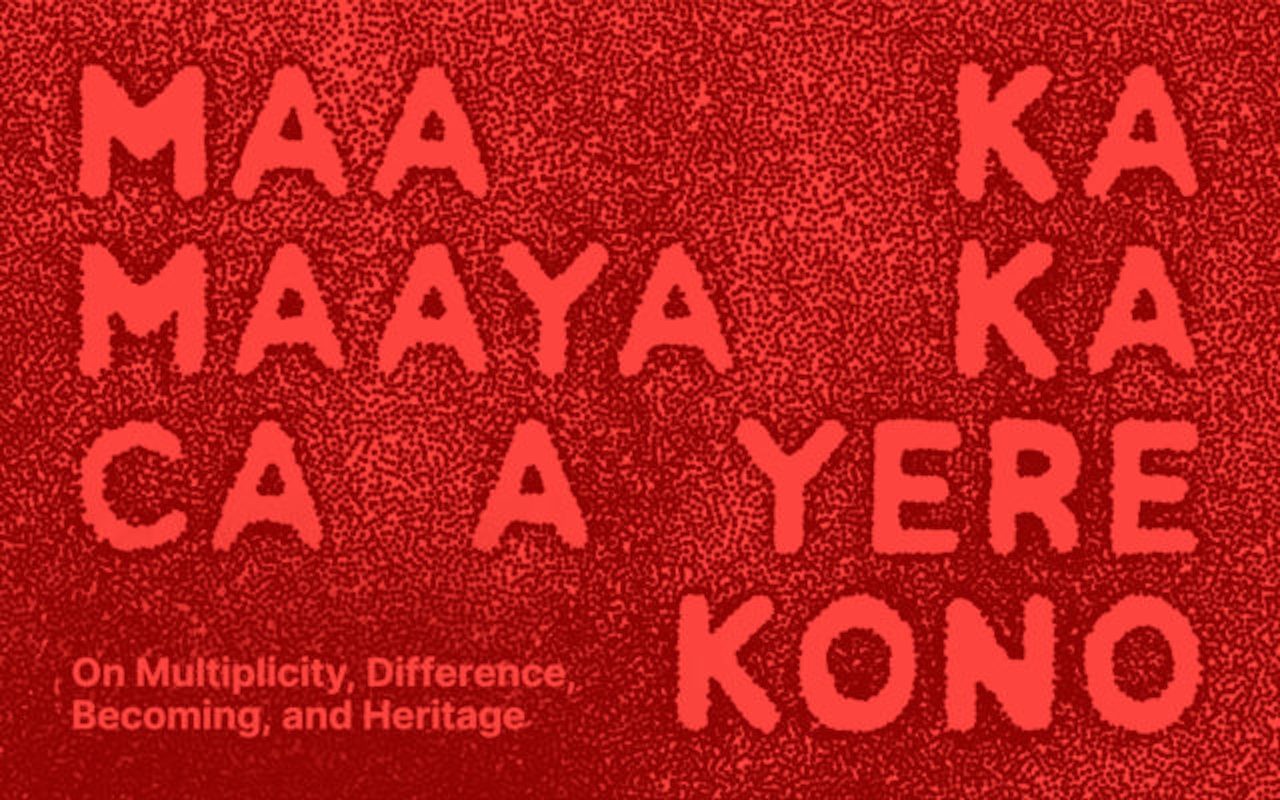
Artists are invited to reflect on such processes of becoming, multiplicities, layered and fragmented identities, vibrant understandings of heritage/patrimony, storytelling, and difference(s).
The call is open to artists from the African world, amateur and professional photographers and video artists, individually or in groups, without age or nationality limit.
CONDITIONS OF PARTICIPATION
Application fee
There is no application fee
Application Deadline
Applications may be submitted until Saturday 31 May 2021, at 00:00 U.S. time
Submission procedure
Applications can only be submitted online on the Bamako Encounters internet platform (Access the application form)
The application must include:
- The completed application form
- A detailed curriculum vitae (max. 2 pages)
- A portrait of the artist and a high-resolution ID photo
- A scanned copy of the current passport until 2022
A note of intent presenting the series and/or the video works, in French or English, in PDF format of 5 pages maximum, containing a clear and concise description of the proposal
In the case of a specific installation, please include images that allow us to visualize or imagine the proposed project
5. Candidates’ portfolio with biography
6. Five high-resolution images (300 dpi for 30 × 50 cm) of recent works (property of the artist), with their technical file (name of the artist, title, date of creation, medium, dimensions, the value of the work, and of the insurance, addresses of the places of origin and delivery)
And/or
7. A folder (zip format) containing the video files (5 max.) of a maximum volume of 2 GB, in h264 and doing between 30 and 50 FPS with a minimum resolution of 3k
You can present several series and apply in both fields (photography/video).
The naming of the files: name_firstname_title_series.
Send your files (photos or videos) in a single zip folder. File name: Last_Name.zip.
The photographers attest and guarantee that the works presented are original creations within the meaning of the law on intellectual property and that they do not constitute the counterfeiting of protected works. They are entirely responsible for their photographic and/or video graphics works presented.
Only submissions that respect these conditions will be considered.
For more information visit www.rencontres-bamako.org or email contact@rencontres-bamako.com (at least 5 days before the closing date of the call).
This call is open to artists of the African world, emerging or established photographers and video artists, individuals or collectives, without age or nationality limits.
How to Apply
- Applications are welcome online via the Bamako Encounters website.
- Applicants must include the completed application form, a detailed CV, a head shot, a portfolio, and samples of recent work (photography, videos, and/or digital works).
Selection
A jury comprising of the artistic director and the curatorial team will select 25 artists based on the quality of their work and artistic relevance. Selected artists will be announced in June 2021.
Application Deadline: May 31, 2021
Registration to participate in this edition is free. Despite the global challenges of COVID-19 and the ever-changing international travel restrictions, the organizers of Bamako Encounters have committed to support engagement on contemporary African photography. They will work with participating artists to accommodate their travel or present their work remotely.
BIENNALE MATTER OF ART ANNOUNCES CURATORS FOR 2022
The newly created curatorial working group consists of Aziza Harmel, Rado Ištok, Renan Laru-an, Piotr Sikora and the tranzit.cz collective. Over the course of this year and the next, the group will be preparing the concept for the second edition of the biennale, which will take place in the summer of 2022 in Prague. The group was formed through an open selection process in which over 30 curators participated. The thematic foundation of the planned biennale builds on current discussions about the decolonization of art institutions with an aim to develop them within the Eastern European context. Curator selection was based on submitted proposals and interviews with participants. The four invited curators (Harmel, Ištok, Laru-an, Sikora) were chosen by representatives and board members of tranzit.cz.
Aziza Harmel (born 1985 in Tunis, Tunisia) is a curator and writer. She has worked at Documenta 14, Steirischer Herbst 2018, and elsewhere. In 2019 she co-curated a research program on curatorial knowledge, Qayyem, which migrated between Mass Alexandria (Alexandria, Egypt), MMAG Foundation (Amman, Jordan), and Atelier Kissaria (Tangier, Morocco). She also co-curated, together with Bonaventure Soh Bejeng Ndikung, Astrid Sokona Lepoultier, and Kwasi Ohene-Ayeh, the 12th edition of Bamako Encounters in Bamako, Mali – the only photographic and lens-based art biennale on the African continent. This exhibition, entitled Streams of Consciousness, served as an invitation to think about the artistic practice of photography outside of the tight corset of the photographic. Since January 2020 she has been a part of the curatorial team of Kunsthalle Wien. Her work revolves around ghostly matters, regimes of visibility, secrecy, and public secrecy. She lives and works in Vienna, Austria.
Rado Ištok (born 1989 in Veľký Krtíš, Slovakia) is a curator, writer, and editor. In 2018–2020 he was the curator of the European Cooperation Project 4Cs: From Conflict to Conviviality through Creativity and Culture at the Nida Art Colony of the Vilnius Academy of Arts, Lithuania, and he is the project leader of Spaces of Care, Disobedience and Desire (2018–2021), a discursive research platform in collaboration with Marie-Louise Richards and Natália Rebelo, supported by the artistic research funding of the Royal Institute of Art in Stockholm, Sweden. Recent exhibitions include Ala Younis: High Dam: Modern Pyramid (2020) at VIPER Gallery in Prague, Czech Republic; The Spectral Forest (2020) at Nida Art Colony, Lithuania; Dalibor Bača: Behind the Scenes (2020) at Modern Art Gallery in Hradec Králové, Czech Republic; Jacqueline Hoàng Nguyễn: Black Atlas (2019) at Július Koller Society in Bratislava, Slovakia; Liquid Horizons (2019) at tranzit.sk in Bratislava, Slovakia; Other Visions (2018) within the PAF – Festival of Film Animation in Olomouc, Czech Republic; and I’m fine, on my way home now (2017) at Allkonstrummet, Stockholm, Sweden. His editorial work includes the forthcoming exhibition catalogue The Spectral Forest (2021) and the e-publication Dwelling on the Threshold (Nida Art Colony, 2020). Together with Jacqueline Hoàng Nguyễn he co-edited the book Crating the World (Athénée Press, 2019), and with L’Internationale he co-edited the e-publication Decolonising Archives (L’Internationale Online, 2016). He lives and works in Stockholm, Sweden.
Renan Laru-an (born 1989 in Sultan Kudarat, Philippines) is a researcher. He is the Public Engagement and Artistic Formation Coordinator of the Philippine Contemporary Art Network. He studies “insufficient” and “subtracted” images and subjects at the juncture of development and integration projects through long-term inquiries, such as Promising Arrivals, Violent Departures, Marawi/Cotabato (ongoing), The Artist and the Social Dreamer, Forecast Festival, Haus der Kulturen der Welt, Berlin (2017), and Lightning Studies: Centre for the Translation of Constraints, Conflicts and Contaminations (CTCCCs), Hangar/Lopez Museum/TPAM, Barcelona/Manila/Yokohama (2016/2018), among others. He has (co-)curated festivals and exhibitions, including the 6th Singapore Biennale: Every Step in the Right Direction, Singapore (2019); Motions of this Kind, SOAS, London (2019); A Tripoli Agreement, Sharjah Art Foundation, Sharjah (2018); the 8th OK. Video – Indonesia Media Arts Festival, Jakarta (2017); and the 1st Lucban Assembly: PAMUMUHUNAN (Waiting for capital), Quezon Province (2015). His independent scholarship has been supported by the Foundation for Arts Initiatives, the National Commission for Culture and the Arts, and other curatorial fellowships. He edited Writing Presently (PCAN, 2019), an anthology of recent writing on contemporary art in the Philippines. Between 2012 and 2015 he directed the self-organized, multi-disciplinary platform and “virtual” organization DiscLab | Research and Criticism. He lives and works between Sultan Kudarat and Metro Manila, Philippines.
Piotr Sikora (born 1986 in Krakow, Poland) is a critic and curator of contemporary art. He defended his master’s degree at the Institute of Art History of the Jagiellonian University in Krakow. He is a member of the Polish Section of the AICA. His curatorial career began with cooperation with the ArtBoom Festival in Krakow, Poland (2009-2015). He worked as the director of the ShowOFF section of the Krakow Photomonth Festival (2013-2015) and as curator for the visual arts program at the Małopolska Garden of Arts in Krakow (2013-2014). In his exhibition projects, he often refers to the issues of identity politics, stereotypes, and prejudices related to the region of Central Europe (the dubious geopolitical region stuck between the former East and the former West). He explores the connections between pop culture, politics, and the art world. His curatorial practice focuses on developing methods of deconstructing great narratives based on the concepts of irony, exaggeration, and provocation. The above-mentioned concepts were present in the exhibitions They don’t know why, but they keep doing it (2011) at Waterside Contemporary in London, United Kingdom; Czech Pope (2014) at Meet Factory in Prague, Czech Republic; Slav Squatting and Its Discontents (2018) at Meet Factory in Prague, Czech Republic, and two shows curated as a duo with Łukasz Białkowski: Intermarium (2016) at Futura in Prague, Czech Republic, and Swag & Threat (2018) at Trafo in Szczecin, Poland. As curator of the MeetFactory AiR Program in Prague, together with Lucia Kvočáková he initiated the platform The New Dictionary of Old Ideas. He is also a lecturer at the Anglo-American University in Prague. Sikora is an ardent player of bike polo and father of a son, Bořivoj. He lives and works in Prague.
tranzit.cz is an initiative for contemporary art and a member of the tranzit.org network, founded in 2002 and working independently in Austria, the Czech Republic, Hungary, Slovakia, and Romania. Over the course of its existence, tranzit.cz has been engaged in numerous international projects and exhibitions within the framework of tranzit.org, such as Monument to Transformation 1989 – 2009; Manifesta 8, Murcia, Spain (2010); Report on the Construction of a Spaceship Module at New Museum, New York City, USA (2014); and others. From 2007 to 2017 tranzit was a part of the project of the tranzitdisplay gallery in Prague. In 2017 tranzit.cz initiated the code of practice of the Feminist (Art) Institution, and in 2018 it established the institution Biennale Matter of Art, which is a member of the East Europe Biennial Alliance (alongside OFF–Biennale Budapest, Hungary, Kyiv Biennial, Ukraine, and Biennale Warszawa, Poland).
12th edition of “Bamako Encounters – African Biennale of Photography” 2020
At the heart of the 12th edition of “Bamako Encounters – African Biennale of Photography”— which is dubbed Streams of Consciousness: A Concatenation of Dividuals and on view until January 31st, 2020—is the question, how do we free photography from the photographic? The biennale takes its title from a 1977 improvised Jazz record by Abdullah Ibrahim and Max Roach, and it seeks to reframe photography by African artists and artists of the Diaspora as an expanded and interconnected field beyond the imagistic. The exhibition likens the medium’s process to the ebbs and flows of rivers such as the Niger, Nile, Congo and Mississippi; bodies of water that have long connected people, ideas, places and cultures. This proposition calls for thinking beyond images to release photography from this fixity and finality while engaging with the fact that they exist as part of a larger context and a presentation-specific whole.
The biennale spreads across 15 venues including the Musée National du Mali, Lycée Ba Aminata Diallo (in a former high school dining hall), Galerie Medina, Palais de La Culture Amadou Hampaté Ba and the stunning, ruinous Cinéma El Hilal. It was organized under the direction of Bonaventure Soh Bejeng Ndikung (founder and artistic director of SAVVY Contemporary, Berlin) and co-curators active on the continent, Aziza Harmel, Astrid Sokona Lepoultier and Kwasi Ohene-Ayeh, alongside artistic advisors Akinbode Akinbiyi, Seydou Camara and scenographer Cheick Diallo, who was responsible for creating imaginative displays in response to the varied sites.
With works by 85 artists and collectives, there was much to see. On view were individual exhibitions by Abraham Oghobase (winner of the Okwui Enwezor Prize for his series of performative photographs, Anatomy of Landscape – Jos (2018), in which the artist uses his body to interrogate residues of British colonial tin mining sites in the Northern Nigerian city of Jos), Nidhal Chamekh, Bouchra Khalili, Selasi Awusi Sosu, Badr El Hammami as well as collective responses by the Association des Femmes Photographes du Mali (AFPM), Invisible Borders and Kamoinge.
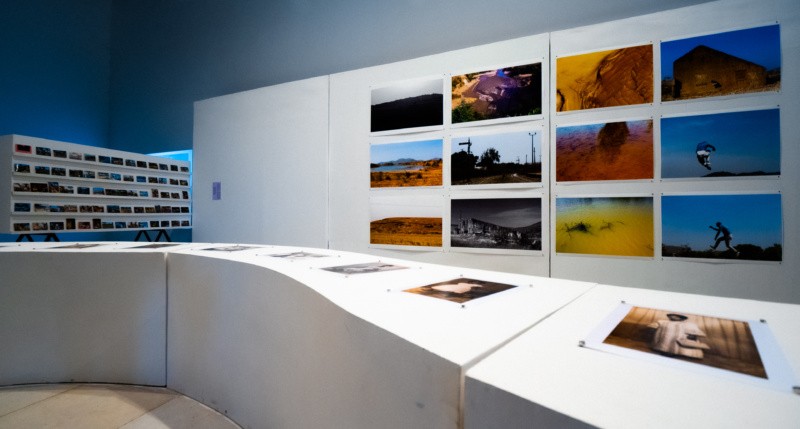
The conflated nature of archives and their malleability for reinterpretation was a subject unpacked by several artists in the biennial. The Otolith Group’s 32-minute video assemblage consisting of still images with captions—The Nucleus of the Great Union, (2017)—created in collaboration with Saidiya Hartman who narrates as a voice-over, quotes from her 2006 book, Lose Your Mother: A Journey Along the Atlantic Slave Route and photographic wallpaper installation (With Other Weapons, 2019)
The collective take to task the subjectivity involved in the historicization of independence rallies across the Gold Coast (present day Ghana). These rallies were spearheaded by Kwame Nkrumah and his eponymous Convention People’s Party on their campaign for independence from British rule in 1953. Their research-based project led to discovering thousands of images taken by the critic, essayist and novelist Richard Wright, of which only a selection of thirty-four were ever published as part of his 1954 book, Black Power: A Record of Reactions in a Land of Pathos, which received critical acclaim for its contribution to scholarship on Ghanaian postcolonial history. The Otolith Group, with this physical and filmic assemblage, re-examines visual representation of Ghana at a time when it was embracing a liberal new future. Conversely, Nidal Chamek’s installation of a hanging textile and slide projection, Nos visages E and Le Miroir (both 2019), gives visibility to the many nameless Senegalese, Malian, Tunisian, Algerian and Moroccan soldiers who fought for French liberation in the First World War. Chamek drawings of soldier’s were based on images from the French magazine Le Miroir, highlighting those that remained on the sidelines of the official narratives of this war.
Other artists mined the concept of identity, challenging it by emphasizing its fluid, shifting nature. A stand-out installation by Eric Gyamfi, titled Fixing Shadows; Julius and I (2018), sees the artist superimpose his self-portrait with that of the prolific New York composer-performer Julius Eastman, a gay, black prodigy who was largely unknown in his lifetime.
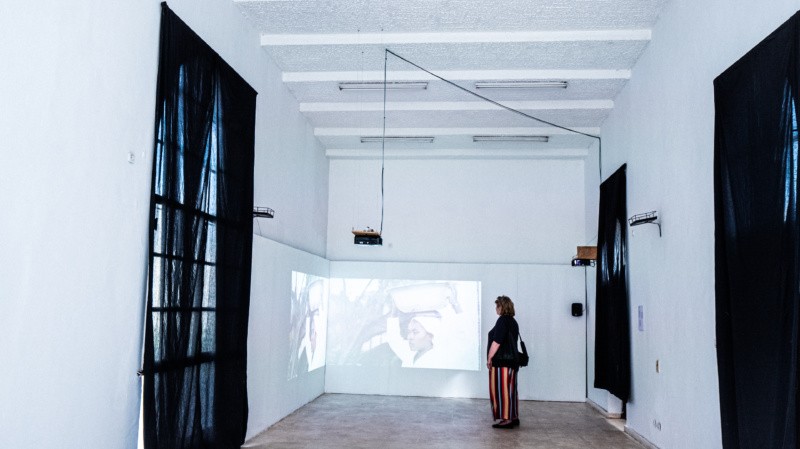
Black-female subjectivities was another prominent thread in the programming. Rahima Gambo’s ongoing project A Walk (2018–in progress) explores walking as a practice for piecing back together fragments of contemporary lives, be they personal or political. Amsatou Diallo’s Scènes de Vie (2017) is a series of digital collages of African iconography and daily life, merged with landscapes of such locales as the conservative American city of Wilson, North Carolina. The work addresses the challenges faced by diaspora populations who occupy adopted homes far from their native ones. Buhlebezwe Siwan—who won the festival’s Bisi Silva Prize for her three-channel installation AmaHubo, (2018)—interrogates the demise of indigenous religious and spiritual beliefs due to Euro-Christian colonialization in South Africa. Using black women’s bodies as active sites to counter colonial violence, Siwan’s 13-minute video takes the viewer on a mesmerizing journey from wine farms to churches and urban areas. In the video, voices in both the South African language isiZulu and English retell stories of past violence on the land as they reintroduce shared rites and rituals that have been demonized by Christianity.
Now in its 25th year, Bamako Encounters has become one of the premier platforms to critically consider developments in photography by artists living and working on the African continent and its diaspora. This 12th edition, with its call to consider photography as an expanding form, and its insistence on shifting from individuality to a self-conscious collectivity, presents the medium as a continuation of visual order across continents, and as a tool for radical ways of seeing and being in today’s world.






